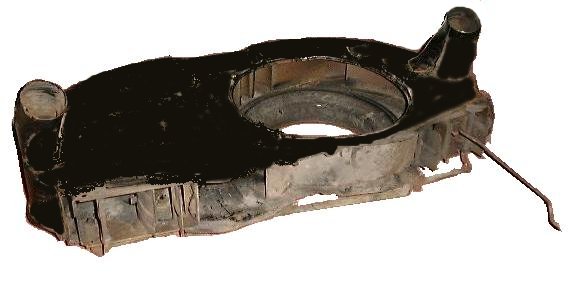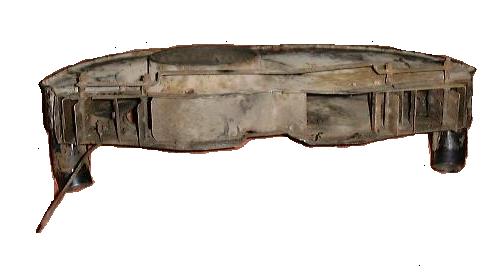
This is how the parts fit together, note the return spring on the connecting rod and the differently shaped left and right flap assembly. |

This is how the parts fit together, note the return spring on the connecting rod and the differently shaped left and right flap assembly. |
The pictures should show you where the flaps are/should be.
Allow me to explain why.
The cooling flaps were designed (by very knowledgeable professionals!) to help the engine warm up to the normal operating temperature faster, and EVENLY. Another reason (perhaps even more crucial to the engine's life) is to protect the engine from overheating.
The operation of the flaps is as follows:
The first part is clear to most people, but it is the second part
that is not so widely known. People who remove the cooling flaps and thermostat,
think they are just restricting airflow and the engine would cool better
without them. This is so wrong it makes me want to cry..
When you remove the flaps, the cooling air shoots DOWN from the fanshroud,
taking the easiest route right past the cylinders. (less restriction).
It does NOT circulate to the side, the hottest parts of the cylinder head,
where it is most desperately needed. As a result, your cylinders may run
cooler, but the heads run hotter. The temperature difference between the
two grows. Anyone who understands basic metallurgics, (they taught this
to you before highschool) should know that different metals have different
thermal expansion rates. The VW engine has different metals in contact
with each other, steel cylinders and aluminum heads. They were designed
to work well together in a certain temperature range. The cylinders NEED
the temperature they were designed to work at, they can actually run TOO
cool. (Remember, an engine wears more when cold, for example engine oils
need to reach certain temperature for optimal lubrication) Now if you remove
the flaps, you disturb the balance, and the two metals start to feel uneasy..
you may get leaks, cracks and God only knows what other problems. A head
that is running too hot, usually starts developing detonation. Some spots
are so hot that the gas/air mixture ignites on it's own, without the spark
plug as the compressions rise. Bad, but gets even worse when the spark
plug fires a fraction of a second later, and the two flame fronts collide...

The flaps installed inside the fan shroud. Generator would point UP.
|
Another thing missing from aftermarket cooling tin is inside the top cylinder tin. There is supposed to be a small air deflector, shaped like an upside down "V", in the middle, near the fan shroud opening. This little "V" piece is very important, together with the 4th fin of the head it forms an air duct and directs cooling air to the most critical parts of the heads. You can see how the 4th fin is *continuous*, forming the lower part of the "duct". (prevents air intended for th eheads from escaping from below the flap and towards the cylinders). Many aftermarket tin is missing this small "V" and the air finds a different route, and never gets to the hottest spots. I have no picture at the moment, but I'm working on it.

Same as above, now from the "backside". Generator would point DOWN.
|
Now, you may hear some people still defend their differing opinion,
they try to back it up with their personal experience and their own test
results: "I get lower engine temperatures when I remove the flaps".
Sadly, this doesn't tell the whole truth, unless they have temperature
sensors all over the engine. A head temp sensor would be nice, but not
many people have them installed.
The location of the temperature sensor may run cooler, but it doesn't
mean the rest of the engine is runnin g cooler as well. Just like the cylinders
are running cooler, when all the cooling air is directed to them. At the
same time, the heads run hotter. It's a matter of WHERE to measure.
I know there are people who swear the flaps should be removed, and are
always ready to present "data" that proves they're right. I wish that after
reading this article those people would give it another serious thought...
and if they still are convinced that they are right and I am wrong, please
do not tell me about it. I don't need to know..:-)